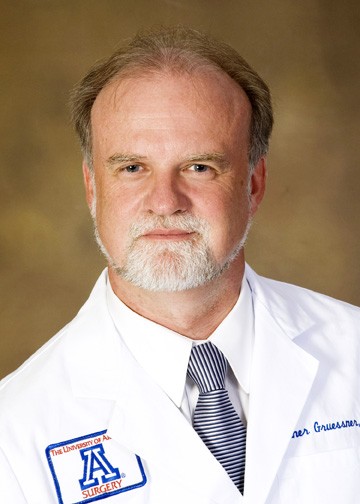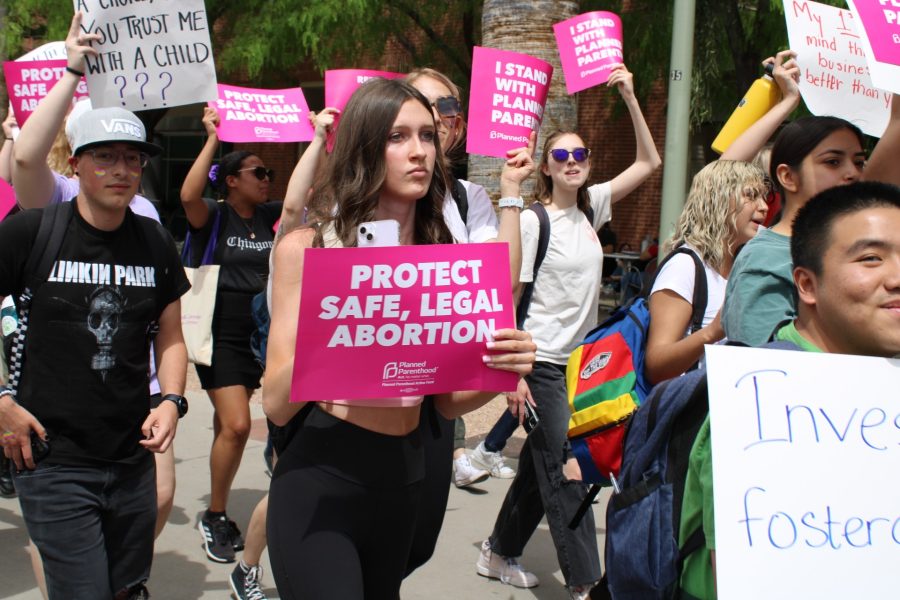Pima County Superior Court Judge Carmine Cornelio dismissed a lawsuit against the UA on Friday.
Cornelio also ordered that University Physicians Healthcare, a nonprofit corporation that employs University of Arizona Medical Center staff, grant Dr. Rainer Gruessner, former chair of the UA Department of Surgery and chief of transplantation at UAMC, internal administrative due process.
Gruessner filed a lawsuit against the university, UPH and University of Arizona Health Network, a nonprofit corporation that integrates UPH with UAMC, in November, after being placed on administrative leave with pay from UPH and the UA.
Gruessner wasn’t seeking damages with the suit and was instead looking to get his job back, claiming UPH terminated him unlawfully and was supposed to give him due process before termination. UPH and the university placed Gruessner on leave after he allegedly altered or directed someone to change medical records. UPH terminated his employment in December. Gruessner remains on leave with pay at the university but was told in an email from former Dean of the UA College of Medicine Steve Goldschmid that he was not allowed to be on the UA College of Medicine campus or at UAMC without first making arrangements with UAMC security, according to court documents.
Complications between Gruessner and Goldschmid began in July when Goldschmid asked Gruessner to step down from his position as chair of the department of surgery, citing a “record of poor performance,” according to court documents. While Gruessner initially refused, he eventually negotiated with Goldschmid and agreed to step down from his position as chair, with the agreement that he’d keep the title for six months. The dean also told Gruessner he wasn’t allowed to keep his position as chief of transplantation.
In September, Gruessner wrote a letter of resignation from chief of transplantation to Karen Mlawsky, chief executive officer of UAMC, something Mlawsky said came as a surprise. She said it takes a lot of planning to replace a leadership position and it’s unusual to have someone resign in the manner Gruessner did.
A day after his resignation, Mlawsky found out that Gruessner had requested counts of primary and secondary surgeons of operation reports from Michael McCarthy, manager of business systems for the department of surgery.
McCarthy said at the hearing, that after he read Gruessner the numbers he’d requested, Gruessner pointed out some flaws in the data that didn’t match operation reports. McCarthy, who is in charge of overlooking information submitted into the hospital’s database, said while Gruessner didn’t directly tell him to make changes to the database, he implied the changes needed to be made.
McCarthy said he began making changes after the initial phone call where Gruessner told him there were errors, but soon realized the reports were more complicated than he expected, so he arranged to meet with Gruessner to talk about the flaws. McCarthy printed out the reported data and sat with Gruessner, who made notes of the flawed data on the print-outs.
Mlawsky said she was relying on that data to see which surgeons within the hospital would qualify to fill Gruessner’s position as chief of transplantation because the United Network for Organ Sharing, the organization that coordinates transplants in the U.S., was waiting for the hospital to respond as to whether it could keep its abdominal transplant programs running.
“It was alarming,” Mlawsky said, “because it was the basis we were using to determine what our response to UNOS would be that very day.”
Cornelio questioned whether transplant programs that are now inactive — the heart, lung, intestine and islet cell programs — would be restored if Gruessner were to get his job back. Getting his job back, the judge told Gruessner, didn’t necessarily mean the hospital would want to proceed with the programs.
“It strikes me that there are things that you would want that they wouldn’t do,” Cornelio said. “I’m pretty sure you and the institution don’t see eye to eye.”
Gruessner said he would do his best to reinstate the transplant programs because it’s in the best interest of the patients, adding that he doesn’t have problems with other staff at the hospital.
“My issue was the dean,” Gruessner said, “and he’s no longer the dean.”
Goldschmid started serving as associate vice president for clinical affairs at the Arizona Health Sciences Center and vice president for physician services for the University of Arizona Health Network a week ago. Dr. Joe G.N. “Skip” Garcia, UA senior vice president for health sciences, will serve as interim dean of the UA College of Medicine — Tucson while the college searches for someone to fill that position.
After a two-and-a-half-day preliminary hearing Cornelio said the court did not have the right to reinstate Gruessner to his previous positions. After dismissing the lawsuit against the university, the judge ordered UPH to arrange a hearing which will offer Gruessner due process and is to begin within 15 days from Friday.
Kraig Marton, Gruessner’s attorney, said they were glad the judge ordered that Gruessner receive due process from UPH. The process may result in reinstatement of Gruessner’s positions.
“We came in with a high likelihood that the judge may dismiss the case,” Gruessner said, “based on technical … formalities.”









